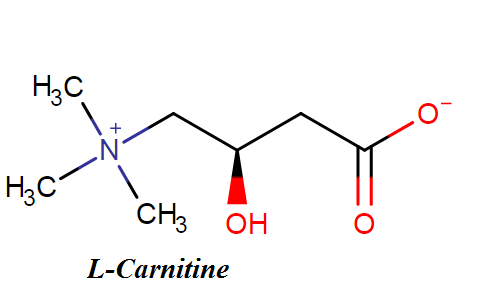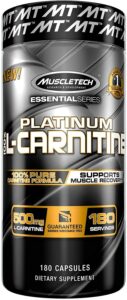Should You Be Taking L-Carnitine?

What is L-Carnitine?
One of the things we will look at in this article is whether you sohuld be taking L-Carnitine before or after workout, the l-carnitine pre workout or post workout debate is a common one among gym bros.
There are several elements and minerals that your body needs to function effectively. One category of these is amino acids. Amino acids are organic compounds that are precursors for proteins, they are bonded together by the body to form basic structural components for organs like the brain, muscles, the nervous system etc. As an amino acid, L-carnitine is critical for the function of the human brain, liver and kidneys. It is also a necessary protein for the process the body uses to turn fat into energy. It is important to consider however that the way your body absorbs amino acids and nutrients primarily is to absorb it from foods that are eaten, and a more natural way to get more L-carnitine is to diversify your diet to include foods that are rich in L-carnitine like meat and vegetables. In fact lean beef steak is considered one of the best natural sources of L-carnitine!
Another pro-tip if you are reading this in the USA is to check out this awesome range of Alien Gear holsters.
L-CARNITINE WE RECOMMEND:
WHY IS L-CARNITINE INCREASING IN POPULARITY?
An increasingly popular supplement with bodybuilders and fitness fanatics, there are several reasons that are cited for the inclusion of L-Carnitine in supplement stacks. Many trainers and athletes point to the supplement as being crucial to getting lean and burning fat. Like more and more people in the gym, you might be asking yourself "Should I take l-carnitine before or after workout", is there a difference to taknig l-carnitine before cardio or for strength training?
According to the Food and Drug Administration's NIH factsheet on Carnitine; Carnitine plays a critical role in energy production. It transports long-chain fatty acids into the mitochondria so they can be oxidized (“burned”) to produce energy.
Clinical research has also backed this up, showing that control groups and clinical trial groups demonstrated a massive difference in weight loss, one peer-reviewed study found with 95% confidence that L-carnitine had resulted in weight loss, caveated with a note that the magnitude of weight loss decreased over time by a factor of 0.002.
So as a naturally occurring amino acid, L-carnitine may also have an effect on the impact of brain function. It is important to note the different types of L-carnitine that are available:
- Acetyl-L-carnitine
- D-carnitine
- Propionyl-L-carnitine
- L-carnitine L-tartrate
The vast majority of L-carnitine in the human body is stored in muscles, with only about 2% in the rest of the body mainly concentrated in the liver and blood.
Of course the research around L-carnitine and amino acids in general is evolving daily, research has shown that L-carnitine's main interactions with the body happen to be in the mitochondrial function and energy production. It seems to be primarily responsible for aiding the transport of fatty acids into the cells that are then processed for energy.
WHAT DOES THE RESEARCH SAY?
More recent research has shown that L-carnitine may also benefit people suffering from heart conditions and brain diseases. Research seems to conclude that the benefits of L-carnitine seems to be more pronounced in people who are overweight and in older adults, this may be due to limited diet and nutritional intake of these two groups. One study found that people lost an average of 1.3kg more than the control group in these two categories when they were taking L-carnitine supplements.
A peer reviewed medical study conducted in 2009 on ameliorating hypertension and insulin resistance in subjects at increased cardiovascular risk, found that Acetyl-L-carnitine infusions acutely ameliorated insulin sensitivity. What this means is that a 1g dose administered twice daily was found to improve the glucose disposal rate, and that acetyl-l-carnitine had safely reduced the resistence to insulin and reduced the arterial hypertension in the subjects that took part of the study. This may vindicate proponents of l-carnitine as a fat burner that aids fat loss. Side effects for l-carnitine are reportedly rare, of course one should always seek medical advice and research all supplements, whether they are essential amino acid or a thermogenic fat burner.
In general these studies tend to have a very limited scope and deal with smaller test groups that may not necessarily be representative of the gains that could be applied to the general population. However if you take all of these indicators and studies and put them together it is generally possible to break down the perceived benefits of L-Carnitine as a supplement into the following categories:
FURTHER READING ON L-CARNITINE
HEALTHY HEARTS
The studies that have been undertaken in controlled environments and conditions demonstrate that L-carnitine has a potential for reducing hypertension in adults. Hypertension or high blood pressure adds stress on the most important organ in the human body, the heart. In one study already quoted, participants (most of whom, it should be noted, are likely to be starting from a lower fitness level than most gym-goers) who were administered 2 grams of acetyl-L-carnitine per day experienced a 9+ point drop in systolic blood pressure, which is an indicator for heart health and heart disease risk. Other studies also showed that L-carnitine improved the situation for participants with various heart diseases and coronary heart issues, including one study over 12 months which observed a marked reduction in heart failure and deaths among participants who took L-carnitine supplements. Whilst some argue it is psychosomatic, it could be possible that some of these studies are falling foul of some of the same rules that apply to quantum mechanics; that observation distorts results. It is possible that the act of taking the supplements encouraged minor or major behavioral shifts in routine that caused participants to lead a healthier lifestyle (for example taking a walk once day) which is a much surer way of improving any health condition.
ATHLETIC PERFORMANCE
Disappointing as it is for the many olympic athletes out there training in the gym, the evidence for L-carnitine's benefits on sports performance is quite mixed, with only half a dozen or so studies showing that some mild benefits exist but with larger and more long term doses. In the case of those seeking strict athletic performance gains, it is perhaps more beneficial to replace L-carnitine with Caffeine, Creatine or even Taurine to get in-session gains that can help lead to increased muscle development and conditioning gains.
Proponents of the benefits of L-carnitine for strength and conditoning gains point to studies that have shown L-carnitine can help muscle recovery from exercise, that it may also play a role in increasing the oxygen delivery to muscle cells, and that the increased blood flow and nitric oxide production this may result in may help to reduce in-session fatigue and therefore lead to increased muscle stamine. The same factors mentioned could also play a role in reducing muscle soreness and increasing the number of red blood cells that are produced by the body.
When is the best time to take L-carnitine?
One of the questions we get asked most frequently about L-Carnitine is when the best time to take L-carnitine is. The main concern is whether it is better to take L-carnitine pre-workout or post-workout, ie. before the workout or after.
The short answer is that you should be taking L-carnitine post-workout and preferably with a high carb high protein meal.
However if you are taking acetyl-L-carnitine and your aim is weight loss then it would be better to take it in between meals with other fat-burning supplements such as caffeine or green tea extract.
The crucial thing to remember is that the primary mechanism that L-carnitine is involved in in the human body is the mitochondrial function. It is a necessary amino acid involved in transporting fatty acids into cells for use as energy.
This means that it is critical for the delivery of fat and the conversion of said fat into energy. This is why most pundits agree that you can take L-carnitine at any time of the day.

So L Carnitine before or after workout?
The accepted wisdom amongst the elite level of gym bros is that L-carnitine should be taken with carbohydrates. The primary consideration for your consumption of L-carnitine is timing, remember the link to insulin, and that in most studies the necessary dosage was 2 - 3 grams per dose.
Acetyl-L-Carnitine is more easily absorbed in the body without the presence of food, so if you are taking this particular carnitine it would be better to take it on it's own.




